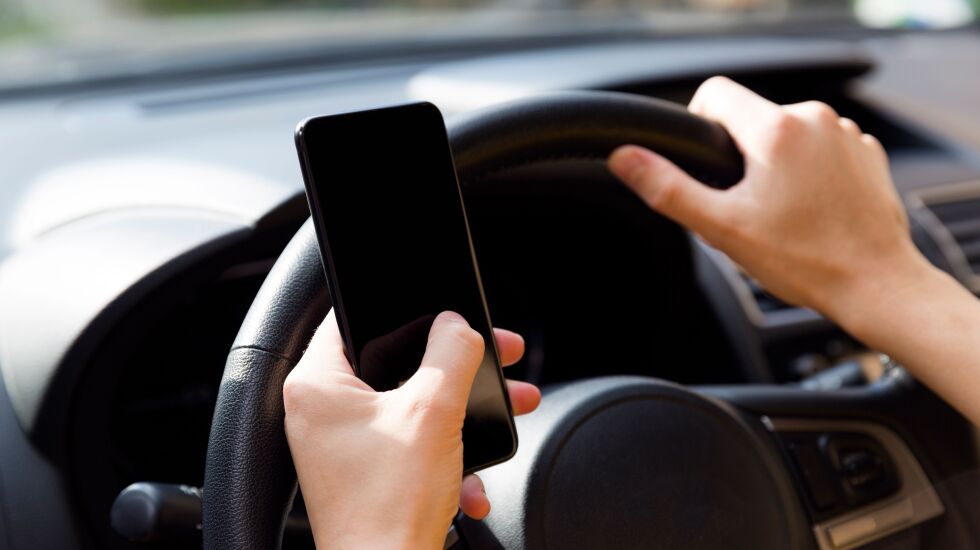
Distracted driving is among the many reasons traffic-related fatalities have increased across the country and in Illinois during the last few years.
There were 3,142 people killed in 2020 alone because motorists decided to talk on their cellphones, text, eat or engage in some activity that kept them from fully keeping their eyes on the road, according to the U.S. Department of Transportation’s National Highway Traffic Safety Administration.
It’s got to stop. Multitaskers behind the wheel should be held accountable — that means, handed a ticket — and reminded their behavior could potentially lead to someone, or themselves, getting killed or seriously injured.
But meting out tickets should not be merely a conduit for the city of Chicago to break the law itself in order to hoard $10 million in fines paid by drivers cited for distracted driving.
Conversely, Chicago police shouldn’t be discouraged from issuing tickets just because the city doesn’t reap the full financial windfall anymore.
Yet that’s exactly what’s been happening, according to a lawyer who filed a lawsuit that was tossed out last year but is now back in the court system, as the Sun-Times’ Fran Spielman reported last week.
Ever since Chicago “got caught” in the summer of 2015 improperly routing the legal proceedings involving distracted driving to the city’s administrative hearing officers instead of Cook County Traffic Court — as state law requires — the number of tickets issued for distracted driving has dried up, said attorney Jacie Zolna.
As a result, between January 2014 and August 2015, the city was able to rake in all of the millions in fines paid by “tens of thousands of motorists” ticketed for distracted driving, according to a lawsuit Zolna filed five years ago.
By sending the cases to hearing officers, the city was able to keep the fines instead of sharing 55% of the revenue with the county and state, the lawsuit charges.
An Illinois Appellate Court judge last week remanded the lawsuit, tossed out in August 2021, back to Cook County Circuit Court.
Meanwhile, now those proceedings are back in Traffic Court, where they belong, police officers are barely stopping anyone for distracted driving, proving the city is motivated by greed — not safety, Zolna told Spielman.
Chicago police on Monday issued a statement, saying it “works every day to enhance public safety in every community. Part of our ongoing efforts include enforcing all traffic laws to ensure the safety of both drivers and pedestrians.”
As for the numbers, a CPD spokesman told us additional data on distracted driving cases could be obtained through a Freedom of Information Act request.
Zolna, however, said the statistics from the FOIAs he submitted to both the city and Cook County Circuit Court show the numbers are down.
In 2014, for example, there were 58,651 distracted driving cases sent to administrative hearing officers.
Last year, between January and March, only 54 such cases in the city were sent to court, and out of those cases, only 18 motorists were convicted, Zolna said, illustrating the drop.
With the recent Illinois Appellate Court ruling, Zolna will be given an opportunity to seek class-action status, possibly forcing the city to refund the $10 million to affected motorists.
It was Zolna’s firm, Myron M. Cherry & Associates LLP, that took legal action against Mayor Rahm Emanuel’s administration, which agreed to give $38.75 million to motorists denied due process after being issued with tickets based on information from red-light and speed cameras.
Distracted drivers, speeders and red-light runners should face the consequences and pay up when the tickets are legit. A broken system designed to fill city coffers is worse than unfair — it’s dangerous.
What does democracy mean to you?
The Sun-Times wants to hear from readers on this crucial question. Is American democracy in crisis? If so, what should our nation do to avert the crisis? What can we do as a country to foster greater civic participation?
Send your thoughts in a letter of 250 words or less to letters@suntimes.com, with “Democracy” in the subject line.
The Sun-Times will publish a selection of letters in print and online on Sept. 15, the International Day of Democracy.







